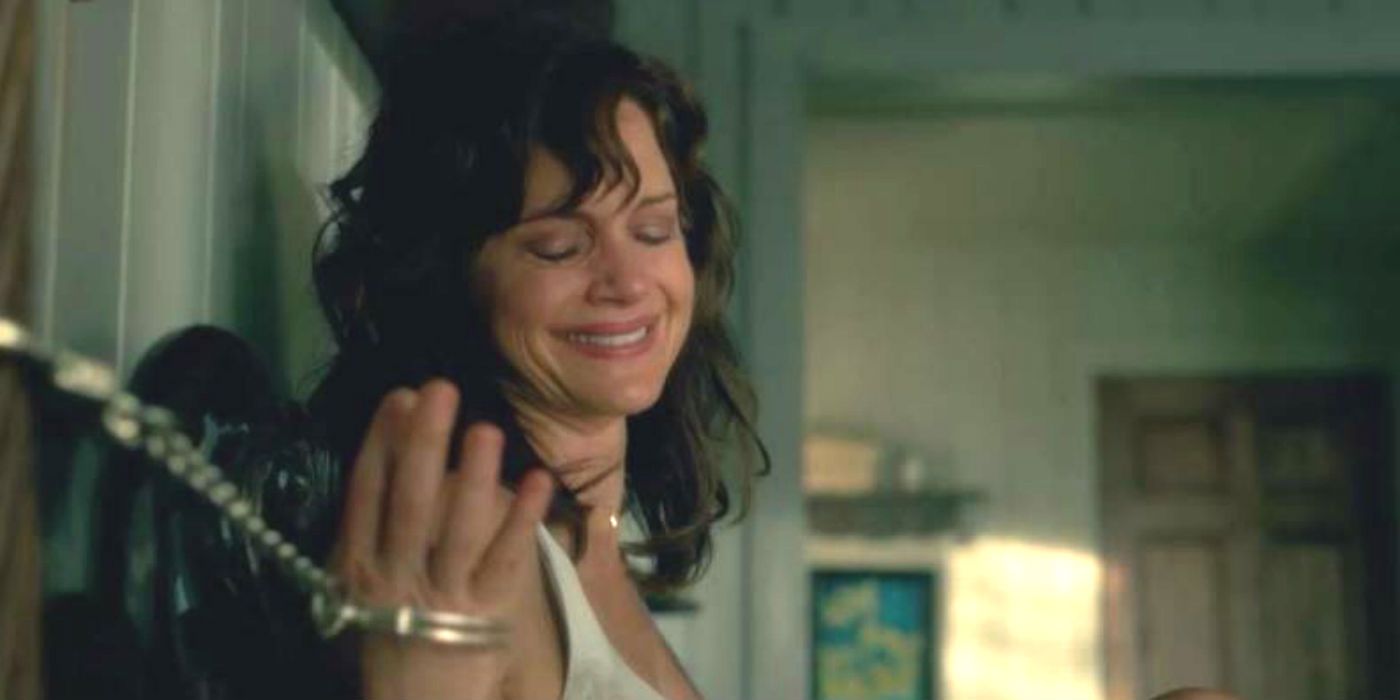Great horror movies evoke visceral reactions from their audience, and Mike Flanagan's adaptation of Gerald's Game for Netflix created one of the goriest, most brutal scenes during the 2010s.
Flanagan's film style is very sleek and creative, with an emphasis on visual imagery that lingers, seared into the minds of those who dare watch his movies. Beyond that, Flanagan has a knack for pulling truly gut-wrenching performances from his actors, and Carla Gugino's performance as Jessie Burlingame in Gerald's Game was a prime example of this. For the longest time, many considered Stephen King's book to be near impossible to adapt for screen, but Flanagan proved them wrong; many consider Gerald's Game to be one of King's weakest books, and also have said the director turned it into one of his strongest film adaptations to date.
Part of the reason why Gerald's Game was so difficult is because the premise heavily relies on one actress (Gugino) in a singular setting. According to Flanagan, King's book was "impossible" to adapt as it was written. In an interview with Independent, Flanagan stated that part of how he turned Jessie's inner monologue and stream of consciousness reactions to her situation into a movie was to utilize her dead husband, Gerald (Bruce Greenwood) into an "outer monologue" by continuing their interactions. However, the slow burn movie reached explosive heights during the notorious "degloving scene".
Gerald's Game's Glass Escape Scene Was Brutal
There have been some major cringe-worthy moments in modern cinema; however, part of what makes the degloving scene in Gerald's Game so brutal is that it was entirely self-inflicted. Horror franchises like Saw have dealt with some of this as well, as Jigsaw's participants are commonly pressed to self-mutilate in order to escape traps and save themselves from a worse fate than what they would cause. Occasionally, this leads to them being left without a limb, missing skin, etc. Gerald's Game is worse, because it's not only exquisitely gory - and doesn't flinch in showing every part of the scene in full - but it's also representative of desperation and symbolic in that it means Jessie has - literally and figuratively - stripped herself bare of her emotional confines along with her actual skin.
The scene is not for the faint of heart, and reportedly made people pass out after viewing, and that's just from sheer gore alone. A degloving injury is described medically as: "a type of avulsion in which an extensive section of skin is completely torn off the underlying tissue, severing its blood supply. It is named by analogy to the process of removing a glove." Similar to the scene where James Franco's character amputates his own arm to save himself from where he's trapped in a canyon in 127 Hours, Jessie's character has made the decision to escape by any means necessary. Her husband is dead on the floor, and throughout the course of the film, she's watched him be partially eaten by a dog. She is also taunted by her own thoughts, which involve situations related to childhood sexual abuse, and encounters a man, who ends up being a real serial killer, while she's handcuffed to the bed.
All of this culminates in the decision to free herself, which has become an absolute necessity and speaks to the human condition of just how strong someone's survival instincts can be, when pressed. That's why the scene is so brutal. As the audience watches Jessie make up her mind, they realize what's happening in torturously slow increments: she grabs the glass, she breaks the glass, she pushes the glass into the bed frame just enough that she can reach up and slice her own wrist... it's horrifying. Yet, there's a strange relief afterwards, when Gerald's Game settles into catharsis before it's ultimately lessened by an ending that didn't quite fit the heights Flanagan managed throughout the rest of the film.


